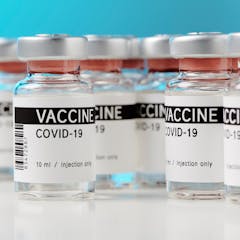
University of Toronto

Established in 1827, the University of Toronto has one of the strongest research and teaching faculties in North America, presenting top students at all levels with an intellectual environment unmatched in depth and breadth on any other Canadian campus.
With more than 75,000 students across three campuses (St. George, Mississauga and Scarborough) and over 450,000 alumni active in every region of the world, U of T’s influence is felt in every area of human endeavour.
Links
Displaying 461 - 480 of 956 articles

Behind Canada’s current COVID-19 vaccine shortage is a decades-long tale of unheeded warnings, missed opportunities and dismantled resources that was never going to end well.

Vaccine selfies are just the tip of the iceberg of doctor frustration over Canada’s fragmented vaccine rollout.

Our lives consist of a complex and dense web of interactions that ultimately make physical and social distancing attempts impossible. And this has always been the case in human society.

One of the factors that has made COVID-19 so catastrophic in long-term care homes was lack of paid sick leave for low-wage workers.

During the ongoing coronavirus pandemic, research in places like refugee camps can continue through mobile devices connected to the internet.

We have unwittingly volunteered our faces in social media posts and photos stored in the cloud. But we’ve yet to determine who owns the data associated with the contours of our faces.

Donald Trump’s tenure as president reveals how pathologies are part of what Americans see as their “exceptionalism.”

There’s no better way and better opportunity for Canada to prove it can be a world leader than now, with a comprehensive global health strategy for the post-pandemic era.

While climate change is certain, some uncertainty remains in its severity — and that’s where the hope shines through.

For many, New Year’s resolutions do not last more than a few days or weeks. A theologian writes how we can learn from the challenges and reflections of Saint Ignatius.

Historically, Muslim scholars have coupled their study of nature to their understanding of Allah. Today, young Muslim women are leading change through an Islamic eco-consciousness with grit.

Fairness issues should be a major concern for eco-labels in their efforts to remain credible during the COVID-19 pandemic and beyond.

People in high-risk groups are already more likely to be experiencing negative mental health effects during the pandemic. Spending the holidays isolated from family and friends may make matters worse.

We should challenge government defunding of universities, and greater reliance on private donations that can affect the transparency, equity and democracy of public institutions, including hospitals.

When allocating resources, we prioritize members of the social groups we belong to, rather than including others in our allocations. This will determine how the COVID-19 vaccine is distributed.

We should applaud drug companies for developing COVID-19 vaccines in record time, but let’s not be under any illusion about the profits that are motivating them.

Australia is still aiming to start vaccinating high-risk groups from March. Why the delay?

If “fairness” is why trans players have been banned by World Rugby, then sport bodies need to realize many athletes have an unfair advantage because of issues like class and cultural backgrounds.

Budget cuts and outsourcing content have affected the amount and quality of science journalism. Scientists should learn to communicate their own findings directly and clearly to the public.

Infrastructure for the mining industry has been prioritized over community-infrastructure for essential human needs.
